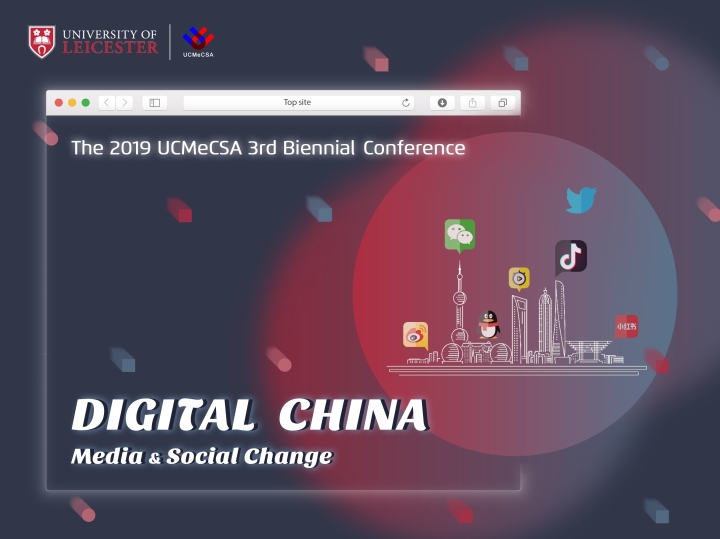
Digital China: Media and Social Change
UK-China Media and Cultural Studies Association 3rd Biennial Conference
16th January 2019, School of Media, Communication and Sociology, University of Leicester (UK)
Keynote Speakers:
Cara Wallis, Associate Professor, Department of Communication, Texas A&M University. Dr. Wallis is an interdisciplinary scholar whose work spans the fields of mobile communication, critical studies of technology, media studies, China studies, and women’s and gender studies. She is the author of Technomobility in China: Young Migrant Women and Mobile Phones, Winner of the 2014 Bonnie Ritter Book Award and Winner of the 2013 James W. Carey Media Research Award.
Manya Koetse, China Social Trend Watcher. Manya Koetse is the founder & editor-in-chief of What’s on Weibo. She is an MPhil graduate in Asian Studies, specialized in Chinese Language & Culture and Japanese Language & Culture.
The theme of this conference is “Digital China: Media and Social Change”. The conference will focus on the impact of digital media on the construction of China’s political, economic, cultural, and social fields. It explores the role of digital media in different aspects of Chinese society and Chinese everyday lives. It also seeks to understand media development in China and comprehensively demonstrate the revolution that has created the brand-new face of Chinese society over recent decades in the wake of new media.
China has experienced a dramatic information and communication revolution in the past few years. Although China’s case is not exceptional in the global trend of digitalisation, it does have its own characteristics. Hong (2016) argues that the speed, scope and scale of growth and development of both the Internet and social media make China receive more attention. An increasing body of scholarship has examined the implications of such digital revolution in relation to civic/political engagement (e.g. Liu, 2017; Wan, 2017; Zhang et al., 2018), social justice (e.g. Chang, 2018), social interaction (e.g. Xu et al., 2015; Chan, 2018), and business (e.g. Luo et al., 2015; Boardman et al., 2018). However, as changes and developments are still continuing in Chinese society as well as the digital media landscape; UCMeCSA aims to organise this academic biennial-conference to invite scholars whose research relates to the above aspects to further contribute to the debate and provide up-to-date knowledge about more recent phenomena. This conference focuses on the following specific areas:
- Digital culture in China
- Digital media activism and civic/political engagement in China
- Digital media and social justice (class, gender, ethnicity, sexuality, religion, ability, etc.) in China
- Digital media and the changing pattern of social interaction in China
- Digital media and the development of consumerism in China
- Methodological concerns in studying digital media and digital culture in the Chinese context
References:
Boardman, R., Cano, M.B. and Deng, S. (2018) ‘Marketing to Chinese Millennials: Weibo as A Marketing Tool For Luxury Brands’, Global Marketing Conference. Tokyo, Japan, 26-29 July. Tokyo: Elsevier, pp. 441-442.
Chan, L.S. (2018) ‘Liberating or Disciplining? A Technofeminist Analysis of the use of Dating Apps Among Women in Urban China’, Communication Culture & Critique, 11(2), pp.298-314.
Chang, J., Ren, H. and Yang, Q. (2018). ‘A virtual gender asylum? The social media profile picture, young Chinese women’s self-empowerment, and the emergence of a Chinese digital feminism”, International Journal of Cultural Studies, 21(3), pp.325-340.
Hong, J. (2017) ‘Social media in China: An unprecedented force for an unprecedented social change?’, Telematics and Informatics, 3(34), pp.691-693.
Liu, B. (2017) Social Media Use and Political Participation in China: The Mediating Role of Political Efficacy. PhD thesis. University of South Florida. Available at http://scholarcommons.usf.edu/cgi/viewcontent.cgi?article=8247&context=etd (Accessed: 19 August 2018)
Luo, N., Zhang, M. and Liu, W. (2015) ‘The effects of value co-creation practices on building harmonious brand community and achieving brand loyalty on social media in China’, Computers in Human Behavior, 48(1), pp.492-499.
Wan, X.A. (2017) ‘A Study of Political Participation in New Media Environment Among Chinese Citizens’, in Xie, Y. (eds.) New Media and China’s Social Development. Singapore: Springer, pp.47-71.
Xu, J., Kang, Q., Song, Z. and Clarke, C.P. (2015) ‘Applications of mobile social media: WeChat among academic libraries in China’, The Journal of Academic Librarianship, 41(1), pp.21-30.
Zhang, S., Li, Y., Hao, Y. and Zhang, Y. (2018) ‘Does public opinion affect air quality? Evidence based on the monthly data of 109 prefecture-level cities in China’, Energy Policy, 116(1), pp.299-311.
